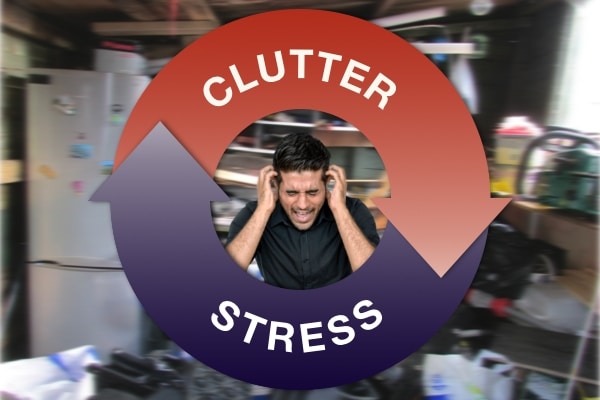
Everyone from the Canadian Association of Mental Health to the Mayo Clinic suggests that decluttering and organizing your home reduces stress and improves well-being. Maybe you have tried to declutter and organize, but you just can’t seem to make any headway. You have read books, magazines, and blog posts and watched online videos and television shows. But the clutter is still there, and the stress keeps building. If this sounds familiar, you might be caught in the all-too-common clutter-stress cycle. To understand how to escape this cycle, let’s look at how stress affects your brain.
Stress and Your Brain
Did you know that stress1 and other intense emotions (grief, fear, sadness, anxiety, etc.) influence the part of your brain known as executive functions. The executive functions control decision-making processes, attention span, and working memory. Here is a typical example of how stress and clutter build on each other.
You are worried about a presentation at work, and that causes stress. Stress hijacks your brain, so you can’t remember where you left your keys in the cluttered entryway. Then, you dig through the clutter and run around the house looking for your keys. This causes more anxiety and stress, which continues to hijack your executive functions. And the vicious cycle continues.
In fact, research shows that some feelings (e.g., grief, sadness, and depression) undermine your ability to make emotionally-based decisions2. So, if you have lost a loved one (pets included) or a job, you might find it hard to sort, categorize, and dispose of sentimental items and memorabilia. If you are moving away from your support network (friends, family, etc.), even for a joyful reason such as marriage or a new job, you might find it challenging to declutter too.
Now that you know about the clutter-stress cycle and how it affects you and your brain, the next step is breaking the cycle. When you reduce clutter, you relieve stress. When you relieve stress, your executive functions will work better, making it easier to declutter and organize your home.
How to Break the Clutter-Stress Cycle
Stop the blame game. When you know that stress interferes with your brain’s ability to organize and make decisions, you can accept that you probably aren’t at the top of your game. Relax, and don’t be so hard on yourself. In short, stop blaming yourself for your inability to “keep it together.”
Get help with the stress. Talk to your supervisor or co-workers to help you reduce your workload – even for a few days. Schedule an appointment with your doctor or mental health professional. Chat with a friend or family member.
Take control. Some studies have shown that people who felt out of control in a situation (e.g., in their messy homes) felt more stress. When people felt in control, they felt less stress3. Step up and take charge. Create a plan to declutter and organize. Prioritize tasks and start working in small increments every day. See my post on escaping quicksand for more tips.
Flip the narrative. Reframe your thought process to say, “get to” instead of “have to.” Thinking, “Yay! I get to streamline my life so I can have more free time and less stress!” is more inspiring than “Ugh! I have to tidy my house.”
Make it fun. Create a 15-minute playlist of your favourite upbeat songs and declutter and organize until the music ends. If you’re working with children, create games like “Put all the [pick a colour or letter of the alphabet] things on the shelf” or “The 10-Second Tidy” (but put items in a basket, not under the sofa cushions).
Establish systems. The clutter-stress cycle feeds on itself and derails complex, flexible thinking. But studies suggest stress has a more negligible effect on your ability to perform routine tasks and habits4,5. This is great news because when you build systems to establish order in your home and schedule, they are less likely to be disrupted when you are overwhelmed.
Hire Out of Chaos. Let the Out of Chaos team come in and quickly declutter to reduce stress significantly. We can also help you establish systems you can use to stay organized and clutter-free so you can work towards a calm and balanced lifestyle.
Image by rawpixel
References
1. Girotti, Milena, et al. “Prefrontal Cortex Executive Processes Affected by Stress in Health and Disease.” Progress in Neuro-Psychopharmacology and Biological Psychiatry, Elsevier, 6 July 2017, www.sciencedirect.com/science/article/abs/pii/S0278584617303652.
2. Fernández-Alcántara M; Pérez-García M; Pérez-Marfil MN; Catena-Martínez A; Hueso-Montoro C;Cruz-Quintana F; “Assessment of Different Components of Executive Function in Grief.” Psicothema, U.S. National Library of Medicine, 28 Aug. 2016, https://pubmed.ncbi.nlm.nih.gov/27448258/.
3. Glass, David C., et al. “Behavioral Consequences of Adaptation to Controllable and Uncontrollable Noise.” Journal of Experimental Social Psychology, Academic Press, 31 Aug. 2004, www.sciencedirect.com/science/article/abs/pii/0022103171900709.
4. Broadbent, Donald E. Decision and Stress. Academic Press, 1971.
5. Hartley, L. R., and R. G. Adams. “Effect of Noise on the Stroop Test.” Journal of Experimental Psychology, U.S. National Library of Medicine, Jan. 1974, https://pubmed.ncbi.nlm.nih.gov/4809657/.
